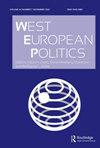德国反遏制抗议的动员潜力
IF 3.6
1区 社会学
Q1 POLITICAL SCIENCE
引用次数: 9
摘要
摘要新冠肺炎大流行引发了整个欧洲的两极分化。虽然大多数公民支持政府的遏制措施,但其他人走上街头表达了他们的不满。这篇文章关注的是与这种异质性抗议浪潮相关的动员潜力。它根据2020/2021年在德国进行的16波滚动横截面调查,调查了表现出同情并愿意参与反遏制示威的个人。结果显示,有相当大且稳定的动员潜力:每五分之一的受访者都同情抗议者,其中约60%的人准备亲自参与。政治不信任、极右倾向和新出现的“自由鸿沟”构成了潜在的结构,与新冠肺炎相关的经济和健康威胁也是如此。此外,研究结果表明了一个激进化过程,并显示了意识形态和威胁感知如何推动从同情到参与意愿的转变,这表明如果有适当的抗议机会,意识形态两极分化可能会迅速蔓延到街头。本文章由计算机程序翻译,如有差异,请以英文原文为准。
The mobilisation potential of anti-containment protests in Germany
Abstract The Covid-19 pandemic triggered polarisation across Europe. While most citizens supported governments’ containment measures, others took to the streets and voiced their dissatisfaction. The article focuses on the mobilisation potential related to this heterogenous protest wave. It examines individuals that show sympathy and are willing to engage in anti-containment demonstrations based on 16 waves of a rolling cross-section survey fielded in Germany in 2020/2021. The results show a considerable and stable mobilisation potential: every fifth respondent sympathises with the protesters, and around 60% of those are ready to participate themselves. Political distrust, far-right orientations and an emerging ‘freedom divide’ structure the potential, as do Covid-19-related economic and health threats. Moreover, the findings indicate a radicalisation process and show how ideology and threat perceptions drive the step from sympathy to willingness to participate, suggesting that ideological polarisation may quickly spill over to the streets given an appropriate supply of protest opportunities.
求助全文
通过发布文献求助,成功后即可免费获取论文全文。
去求助
来源期刊

West European Politics
POLITICAL SCIENCE-
CiteScore
10.00
自引率
7.10%
发文量
58
期刊介绍:
West European Politics (WEP)has established itself as one of the most authoritative journals covering political and social issues in Western Europe. It has a substantial reviews section and coverage of all national elections in Western Europe. Its comprehensive scope, embracing all the major political and social developments in all West European countries, including the European Union, makes it essential reading for both political practitioners and academics.
 求助内容:
求助内容: 应助结果提醒方式:
应助结果提醒方式:


